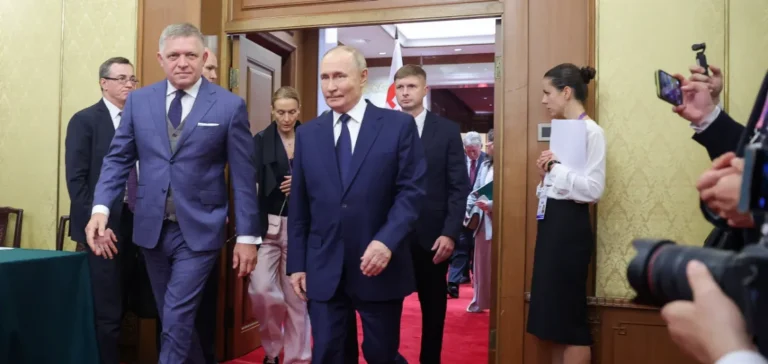Russian President Vladimir Putin publicly urged Slovakia to cut off its energy deliveries to Ukraine during a bilateral meeting with Slovak Prime Minister Robert Fico in Beijing. The appeal comes amid ongoing tensions between Moscow and Kyiv, as strategic infrastructure tied to regional energy supply continues to be targeted.
Putin praised the “independent” political stance taken by the Slovak government, stressing the importance of closer cooperation among Central European countries opposed to Brussels’ measures since the beginning of the war in Ukraine. Slovakia, while a member of the European Union and the North Atlantic Treaty Organization (NATO), remains dependent on energy imports from Russia, particularly natural gas.
Ukrainian strikes threaten Russian infrastructure
Over the summer, Bratislava and Budapest formally appealed to the European Commission to denounce what they described as repeated Ukrainian attacks against Russian infrastructure. These strikes, carried out in response to heavy Russian bombardments of Ukraine’s energy system, hit major installations, including the Druzhba oil pipeline.
Commissioned in the 1960s, the Druzhba pipeline still connects Russia to several Central European countries, including Slovakia. Although the European Union imposed an embargo on most Russian oil imports in 2022, the pipeline’s operation was temporarily maintained to ensure supply to certain landlocked states.
A call to freeze reverse flows
In this context, Vladimir Putin proposed a retaliatory measure at the regional level, calling on neighbouring countries of Ukraine to halt so-called “reverse flow” deliveries. He stated that Kyiv continued to receive significant energy volumes transported from its eastern neighbours.
“Cut off the reverse gas flows, block the energy deliveries,” declared the Russian president. This demand directly targets the transit mechanisms established after 2014, which allow Ukraine to receive gas from Slovakia and other Central European countries without relying on Russia’s traditional supply routes.
A strategic issue for Central Europe
Slovak Prime Minister Robert Fico, known for his critical stance on military support to Ukraine and on European sanctions against Moscow, has not confirmed any intention to alter current energy policy. However, Russian pressure could reopen the debate over the diplomatic balance between European solidarity and national interests in energy security.
The potential suspension of reverse flows would directly affect Ukraine’s energy stability, especially during winter peak demand. For Slovakia, such a reversal would raise legal and logistical questions regarding compliance with European commitments and existing transit contracts.






















